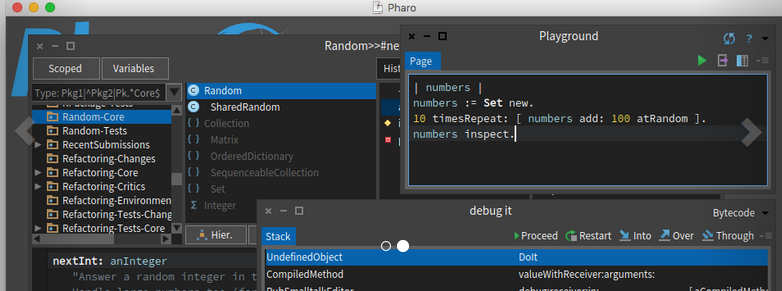| Pharo 6.0 Moves To 64-Bit |
| Written by Kay Ewbank | |||
| Friday, 09 June 2017 | |||
|
Pharo 6.0 has a new code changes management system, and 64-bit versions for Linux and OSX. Pharo is an open-source Smalltalk inspired language and core library. Everything in the Pharo language is an object, in the sense of object-oriented programming. The language is dynamically typed; inheritance is simple; memory management is automatic via a garbage collector and its syntax is very simple and small. There's a sizable Pharo community, and the developers make regular commits and provide almost daily bug fixes. The language has a number of ways to interface with C, and there are Java and JavaScript libraries.
The new 64-bit version improves performance and stability, but the developers point out that this is a new technology that is still showing fails for a small amount of tests. The new code changes management system is named Epicea. It is designed to make it easier to review and recover your code. It is designed for developers who aren't using git, and rather than having .changes files, it enables you to see what you changed in a given session. Another addition is integrated support for Git through an easy-to-use tool for repositories and commits management. The new tool is named Iceberg, and is included as a preview for Pharo 6 with plans to make it the default in Pharo 7. Elsewhere the unified foreign function interface (UnifiedFFI) for interfacing with the outside world is significantly improved, and Pharo can now be bootstrapped from source code managed by Git. The PharoVM is now part of the OpenSmalltalk initiative. OpenSmalltalk is a cross-platform virtual machine for Squeak, Pharo, Cuis, and Newspeak. Previous releases of Pharo used a fork of the CogVM, which was then moved to GitHub and renamed OpenSmalltalkVM. The developers of Pharo 6 have now merged their changes back into the main OpenSmalltalk VM repository. Other changes to the new release include the introduction of object immutability, alternative bytecode sets and block closures independent of outer context. The new release is said to have improved modularity and to be faster. VMs apparently are up to 200 percent faster, while the use of FastTable underpins improvements to the performance of the graphical user interface. FastTable is a re-implementation of Pharo lists, which are used to show data.The data sources for the old lists were limited to a couple of hundred rows, and previous implementations handled the list elements as a large collection of morph widgets which was very slow. FastTable solves this issue by using a data source based implementation that instantiates its elements only when it needs to show them.
More InformationRelated Articles
To be informed about new articles on I Programmer, sign up for our weekly newsletter, subscribe to the RSS feed and follow us on Twitter, Facebook or Linkedin.
Comments
or email your comment to: comments@i-programmer.info |
|||
| Last Updated ( Wednesday, 19 September 2018 ) |



